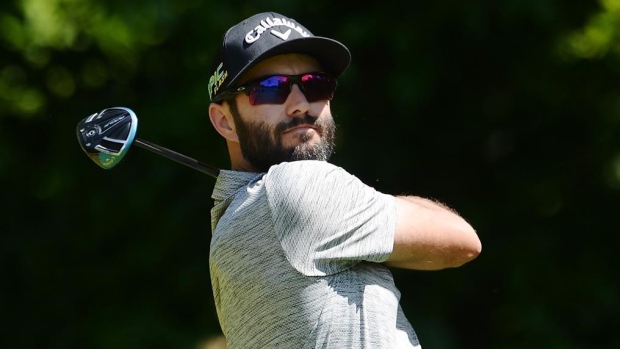Nov 6, 2020
Hadwin hopes hard work shows at Masters
Canadian feels his game is in a good place for this unusual edition of the Masters, Bob Weeks writes.
By Bob Weeks

After what he called a long stretch of frustrating golf, Adam Hadwin feels he’s finally seeing some results from the hard work he’s been putting in.
It comes at a perfect time for the Abbotsford, B.C., product as he prepares for his third trip to Augusta National for the Masters.
“I feel like I’m turning the corner with my game,” he said. “I’m finally seeing the shots that I want to see.”
Hadwin has plodded along since the PGA Tour restarted in June, trying to find his game. While he only missed one cut in that 14-tournament stretch, he also only finished inside the top 10 once, a tie for fourth at the Rocket Mortgage Classic in July. The other performances were middle-of-the-pack finishes, something that exasperated the two-time Presidents Cup golfer.
The lacklustre play comes despite plenty of time spent on the range, trying to sharpen his swing. In fact, Hadwin said the last few months have been the hardest he’s worked in his career. He’s seeing enough quality shots that his scores should start improving. Now, he believes, it’s just a matter of playing golf.
“I think I’m just getting in my own way and not letting it happen on the course,” Hadwin said. “I’ve diagnosed myself more than I’ve ever diagnosed myself and that could be part of the problem.”
In his two previous trips to the Masters, Hadwin finished tied for 36th and tied for 24th. He said the course appeals to him and in some ways, reminds him of the designs he grew up on in B.C., with the tree-lined fairways.
While he continues to learn the nuances of the greens at Augusta National, he will have one advantage in that no greens-reading books will be permitted at the Masters. Hadwin never uses those on the PGA Tour, so there won’t be any change to his procedure on the putting surfaces.
“If I can drive it well, I feel like I can be competitive,” he surmised.
Hadwin will continue to pick the brain of Mike Weir, with whom he’ll play a practice round on Tuesday. He did that in his first two Masters appearances and it paid off.
“He would take us to certain spots on the greens and tell us to hit a putt,” related Hadwin, who celebrated his 33rd birthday on Nov. 2, “and we would totally misread it. Or on 13, he would show us where to lay up depending on where the pin was. That’s the kind of information that he’s passed on to us that only comes from experience.”
Something no one has experienced will be a Masters with no patrons. The closest Hadwin has had to playing in near silence came in 2017 when he went out on the back nine on the Sunday before the tournament, calling it eerie.
“This one will be different. You live through the fans’ reactions at the Masters,” he said. “You can just hear that sound pumping through the trees.”
As well as being a quieter tournament, Hadwin said the sightlines could be different with no patrons framing the holes. The look during the tournament might take some getting used to and require some extra preparation.
That will come over the next few days when the Canadian crams for the last men’s major of the season. With two weeks of rest, optimism for his game and at a course that he loves, Hadwin appears to be in a good place for this unusual edition of the Masters.
